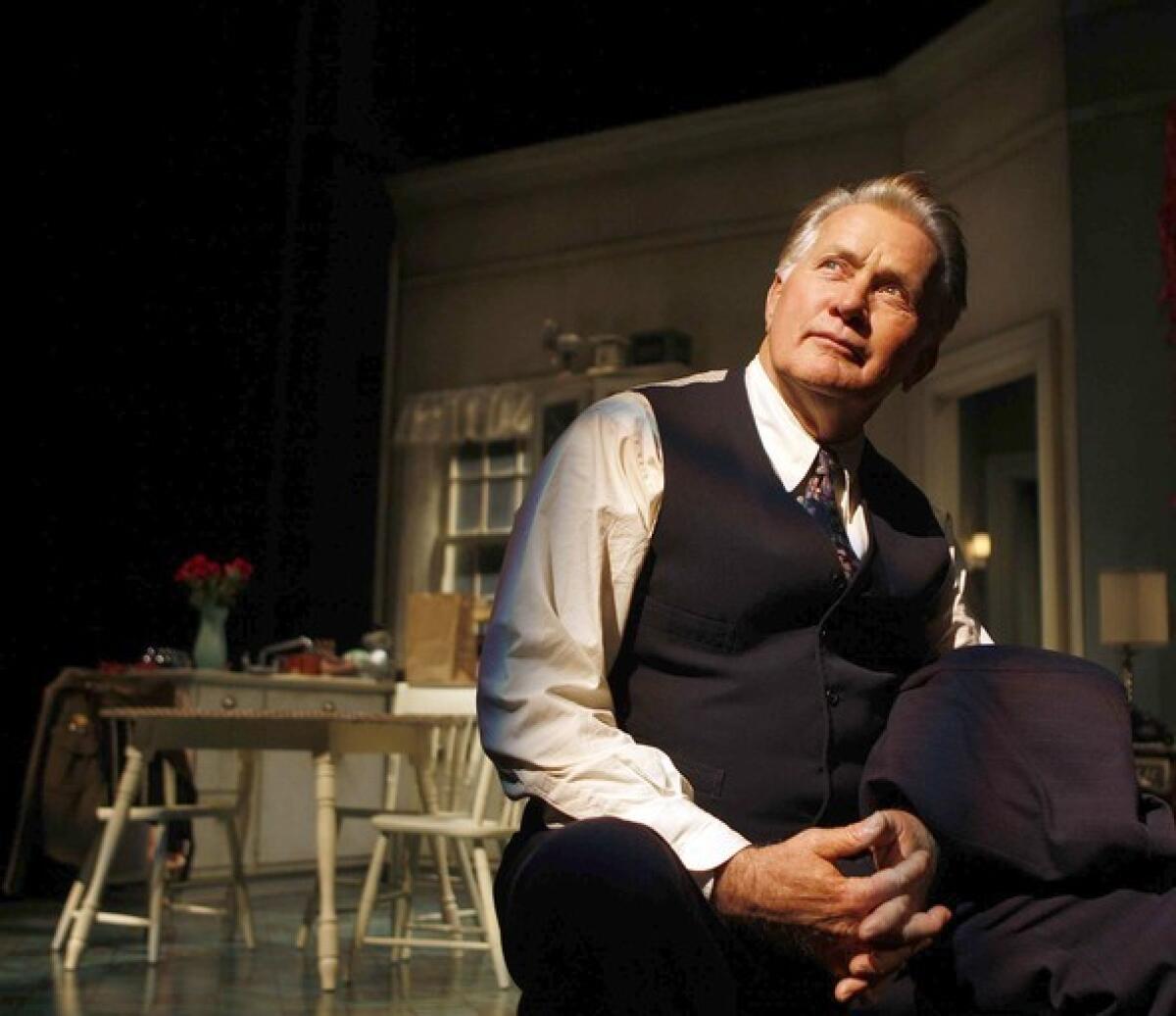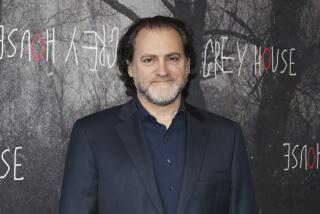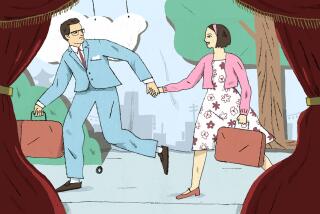Martin Sheen comes full circle with ‘The Subject Was Roses’

A man many Americans still think of longingly as President Josiah Bartlet is waiting for a light to change at the intersection of Washington Boulevard and Hughes Avenue in Culver City. He is on foot and in conversation with a companion, on his way to Saturday evening mass, but when he sees the people in a car parked at the light waving through the windshield at him, he turns and waves back, offering them a glimpse of his open face and very good set of teeth before hurrying into the crosswalk.
He’s just like on TV, the smiling people in the car might be thinking, because Martin Sheen, in jeans and windbreaker, is very much the Everyman he brought to the fictional White House of “The West Wing” for seven seasons on NBC.
No need to genuflect. He’ll be doing the genuflecting once he’s inside St. Augustine Catholic Church a few blocks away.
Though a resident of Malibu, Sheen has been rehearsing the play “The Subject Was Roses” on this recent day, and unable to get back home in time for his regular Saturday mass, he’s found a neighborhood church to attend instead.
“It’s a weekly affirmation for me,” he says, walking briskly. “To be with others thinking about God.”
“The Subject Was Roses,” which opens at the Mark Taper Forum next Sunday, marks Sheen’s return to the stage (other than readings) for the first time in almost 20 years, and he’s coming back in the play that launched his career in 1964, on Broadway. Written by Frank Gilroy, “The Subject Was Roses” is an emotionally raw family drama about an unhappily married Irish American couple and their only child, a son just returned from World War II. The son finds that he has left one war only to come back to another, but that what he learned in Europe makes it possible for him finally to escape the war at home.
On Broadway, Sheen played the son; 46 years later, he’s playing the father.
“That play changed my life so thoroughly,” he said earlier, after finishing his scene work for the day with Frances Conroy (“Six Feet Under”), who plays his long-suffering wife in the Taper production, directed by Neil Pepe. “It was the first success I had, and the only Broadway success I ever had. It gave me such confidence. An actor needs some measure of success. It was the first confirmation of my talent and my possibilities. I was 24.”
A native of Dayton, Ohio, the seventh son of a Spanish factory worker and politically active Irish mother, Sheen, who was born Ramon Estevez, had gone to New York at 18 and found his way into the avant-garde Living Theatre run by Julian Beck and Judith Molina as well as Joseph Papp’s Shakespeare in the Park. Papp insisted on calling him “Ramon” even after he took the stage name “Martin Sheen” in an effort to get more work.
Sheen spent 10 years, from 1959 to ‘69, in New York. His children -- Emilio, Ramon, Charlie and Renee, all actors at one time or another -- were born there. He is still married to their mother, the former art student Janet Templeton.
“The theater was predominant in terms of acting,” Sheen said, “but then came people like James Dean and a different cinema acting technique that was just revolutionary because it was about behavior -- Montgomery Clift, Brando. Those three changed cinema all over the world.”
Dean in particular, in the 1955 film “East of Eden,” was a powerful influence on him. “You see this guy and you think, ‘Oh . . . my . . . God.’ Wow. And I never really appreciated what he did until I did my first on-camera stuff, and how you had to repeat everything and hit marks and have the camera move with you.” Sheen even changed his brand of cigarette. “I was smoking Camels or something, but James Dean smoked Kools. I had to switch.”
Launching pad
But it took success in the theater, in this play, to win him the notice that led to his eventually moving to L.A. and a prolific career in television and film that has stretched from a small role in “The Mod Squad” to “The West Wing” and included the movies “Badlands,” “Apocalypse Now,” “Gettysburg” and “The Departed.” Long identified with liberal causes and social justice, he has portrayed his share of real political figures in addition to President Bartlet, often endowing them with a bristling sense of patriotism. On television Sheen has played John Kennedy (“JFK”) and Robert Kennedy (“The Missiles of October”), not to mention John Dean (“Blind Ambition”).
“When we did this play in ’64 in New York, there were a limited number of venues -- the three networks, soap operas, commercials, off Broadway, summer stock, Broadway,” Sheen said. “And then Hollywood, which was a completely different animal. Maybe people didn’t want to admit it who were pursuing careers in the theater but we all wanted to be movie stars, you know,” he laughs, “where you could have your cake and eat it too -- become known and then come back and do Broadway.
“It’s not even the same profession, stage and film acting -- I mean it is the same profession but a totally different technique, totally different energy. And very few left from my generation who still do it.”
“The Subject Was Roses” won a Pulitzer Prize and ran for nearly two years in New York. Thinking back on that, Sheen was reminded that, “Stage actors are like athletes. You’ve got to stay in shape,” he said, grinning at the task before him now. “It’s real clear, you can’t take it lightly. To do a run, you know, eight performances a week. You don’t mess around with the theater.”
And it’s one thing to do that when you’re 24. He’s now 69.
“What’s struck me about Martin,” says Pepe, “is the great sense of joy and commitment he’s bringing to being onstage, as if he’s discovering it for the first time.”
“As soon as I saw him, I fell in love,” says Gilroy about the young Sheen. Now 84, Gilroy helped cast the play in ’64 with director Ulu Grosbard, who also directed a film adaptation that retained Sheen and Jack Albertson, the original father. “He had that spark, that something you respond to.”
Gilroy had seen in Albertson something of his own Irish father, but the playwright says, “Physically, Martin has more of the qualities of my father than Jack.”
Sheen is reaching back for memories of his own father as inspiration for the role. He remembers his difficult childhood in Ohio, growing up in a big household, his father a shy widower, “who was a tiger at home.”
Sheen went to work at the age of 9 as a caddie at the local country club, where he was exposed to other kinds of men, affluent, imperious men whom he did not like. “I knew how I didn’t want to be when I grew up -- racist, self-absorbed. That was not a man to me. A man was my father, who probably never made more than $140 a week. I learned a lot about acting from him too; he was a great storyteller.”
On his own role as a father, Sheen said, “Now I’m almost 70, so I’ve had a whole lifetime of understanding where I failed, although you’d have to ask my kids where I failed. I made mistakes, monumental mistakes, but whatever they were, they were made out of my understanding or misunderstanding of love at the time.
“I’ve often said to my wife, ‘If I had it to do over again, there are certain things that I would not do,’ and she says, ‘That’s true because now you know, but then you would have done other things, and they could have been equally damaging.’ When you’re starting out, you’re 20, you’re not 70. It’s on-the-job training.”
Admittedly anguished over the personal troubles of his son Charlie, the star of CBS’ “Two and a Half Men,” who was charged Monday with a felony in connection with alleged domestic violence involving an incident with his wife last month in Aspen, Sheen did not want to talk about Charlie publicly.
“It’s very, very painful,” he said.
“I don’t know what Frank’s dad was like,” he said, returning to the subject of his character, “but I can relate to this guy having to struggle with poverty growing up.”
The father in “The Subject Was Roses” is an alcoholic and philanderer. An unsuccessful businessman, he and his disconnected wife have allowed their 25-year marriage to founder, damaged by desultory rancor and possessiveness of their only son (played in this production by Brian Geraghty of “The Hurt Locker”).
“What keeps them together is the boy,” Gilroy says, “but they probably wouldn’t have stayed together today.”
“It’s a period piece,” Sheen said, “and that’s very important, but the relationships are not that far removed. Alcohol is still a big problem, ego is still a big problem, people are still grappling with the same issues.”
When he reaches St. Augustine after the rehearsal, Sheen passes through the big doors at the stroke of 5 and makes his way down the far aisle of the sanctuary to an empty pew in the half-full church. The largely Latino congregation takes little note of his entrance. He makes the sign of the cross and genuflects toward the altar before taking a seat, then kneels in prayer.
Over the next hour, he sings “hallelujahs,” raises his arms in supplication according to the liturgy, hears a lesson from the Book of Luke, turns to his companion, extends his hand and says, “Peace be with you,” then repeats the ritual with two other worshipers. Later, he joins the procession down the center aisle to receive Holy Communion.
On the way out of the church, he puts some money in a slot designated for votive candles, lights a long wooden match and then a fresh candle in the bank of flickering red votives.
“Do you see a candle on that side,” Sheen says, offering his companion the flaming match. “I paid for two. Light a candle for someone.”
More to Read
The biggest entertainment stories
Get our big stories about Hollywood, film, television, music, arts, culture and more right in your inbox as soon as they publish.
You may occasionally receive promotional content from the Los Angeles Times.






